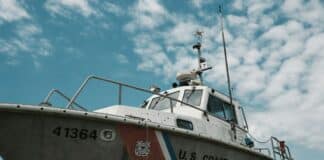The Trump administration has commissioned the polar icebreaker USCGC Storis, marking a historic step in Homeland Security Secretary Kristi Noem’s “mission to transform the U.S. Coast Guard into a more agile, capable fighting force ready for the challenges of the 21st century,” DHS announced.
The Storis is the nation’s first polar icebreaker in 25 years, the department explained, and serves as a symbol of the country’s “renewed commitment to defend our Homeland in the Arctic under President Trump,” expanding upon the U.S.’s operational presence in the Arctic region.
Icebreakers are critical for supporting America’s presence in the region, the agency explained, as the area has growing potential for “oil and gas exploration, critical minerals, trade route traffic, fishing, and tourism.”
“The commissioning of Storis marks a new beginning for the U.S. Coast Guard,” Deputy Secretary of the Department of Homeland Security Troy Edgar said of the development. “President Trump’s One Big Beautiful Bill has recapitalized USCG with $25 billion – the largest single investment in USCG. The new investment will lead to a USCG that is better equipped to protect our national interests, support our maritime communities and stand alongside our allies.”
“USCGC Storis is a major win for the American people,” said Adm. Kevin Lunday, Acting Commandant of the Coast Guard. “The commissioning of USCGC Storis immediately strengthens our ability to control, secure, and defend the U.S. border around Alaska and maritime approaches in the Arctic. Storis is the first step of a historic investment in the Coast Guard to add critical capacity to our polar icebreaker fleet to protect U.S. sovereignty and counter malign influence throughout the Arctic.”
Last week, the U.S. Coast Guard detected two Chinese vessels in the U.S. Arctic. “The presence of these vessels is consistent with a three-year trend of increased activity from Chinese research vessels operating in the U.S. Arctic. Last year, three Chinese research vessels conducted research operations north of the Bering Strait,” the USCG said of the matter.





